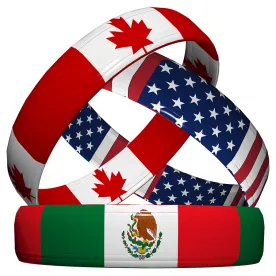On March 8, 2018, President Trump issued two proclamations announcing tariffs on steel and aluminum imports to the United States. As foreshadowed on March 1, the tariff levels will be 25 percent on steel imports and 10 percent on aluminum imports. These tariffs will go into effect on March 23.
Imports from Canada and Mexico will be exempt from tariffs on both steel and aluminum based on their shared commitments to addressing national security concerns and global excess capacity, as well as the physical proximity of their industrial bases and the robust economic integration among the three countries.
President Trump’s proclamations indicated that additional country-specific exemptions or modifications may be granted in the future to other allies. Specifically, President Trump invited any country with which the United States has a security relationship to discuss alternative ways to address the threat to U.S. national security posed by imports from that country. If a satisfactory means of addressing that threat is agreed upon, tariffs on imports from that country may be removed or modified. If necessary, tariff rates may be increased on imports from other countries that do not receive an exemption or modification.
The European Union—which is the second-largest foreign supplier of steel and aluminum to the United States, after Canada—has expressed concern about the imposition of these tariffs and may take a variety of actions in response. Specifically, the EU may challenge these tariffs in the World Trade Organization and/or impose retaliatory tariffs of their own. Covington’s Péter Balás, who most recently served as Deputy Director General, DG Trade to the European Commission, is monitoring the EU response.
Both proclamations also set forth a framework for seeking product-specific exclusions from the tariffs on steel and aluminum articles. Specifically, relief may be granted (1) for articles of steel or aluminum that are not produced in the United States in a sufficient and reasonably available amount or of a satisfactory quality, or (2) based on specific national security considerations. Determinations regarding such product-specific exclusions will be made by the Secretary of Commerce, in consultation with the Secretary of Defense, the United States Trade Representative, the Assistant to the President for National Security Affairs, the Assistant to the President for Economic Policy, and other senior executive branch officials. Within 10 days, the Secretary of Commerce will issue procedures for requesting product exclusions.
This March 8 announcement follows a March 1 listening session, during which President Trump announced that tariffs would be imposed on steel and aluminum imports. On February 16, the Department of Commerce announced that it had recommended the imposition of global tariffs or other trade restrictions pursuant to its ongoing national security investigations of steel and aluminum imports under Section 232 of the Trade Expansion Act of 1962.
James Smith and Kate Gibson Contributed to this article.




 />i
/>i
